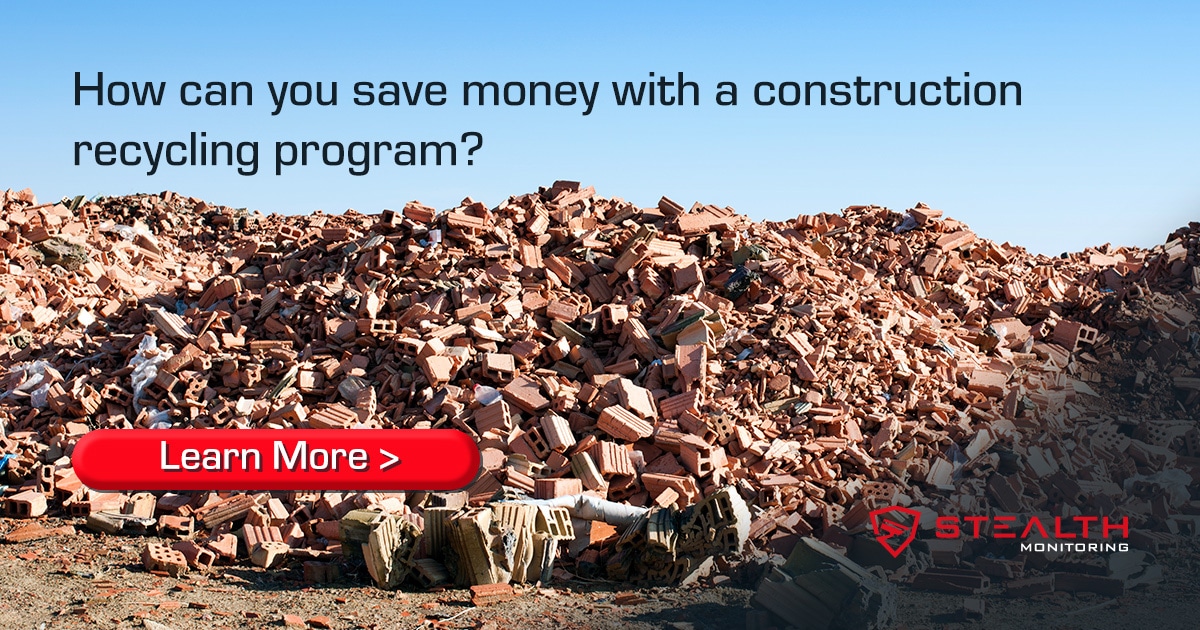Construction companies could be leaving money on the table by not doing any scrap metal recycling. Some think it’s too much work and too complicated to recycle debris. The truth is that construction waste recycling can reduce expenses, especially end-of-project costs. It’s not as complex as you might think.
Yes, the leftovers are worth more than what you’d expect. Not only do you cut expenses, but you also help the environment. Scrap metal recycling gives new life to metal without the negative side effects of mining raw material.
Here’s what you need to know and do to get started with the recycling of construction materials.
Benefits of Construction Recycling
According to the Construction and Demolition Recycling Association (CDRA), one of the largest sources of solid waste comes from construction and demolition (C&D) debris. Though a lot of debris tends to go to the landfill, organizations like ISRI, CADI and CDRA are working to turn this around with the recycling and recovery of resources found in the debris.
The scrap recycling business has grown and provides many jobs and economic benefits. An ISRI study
reports the scrap metal industry produces $117 billion in economic activity. This is the size of the automotive industry.
More than 500,000 people have jobs in purchasing, processing, and brokering scrap metals. In 2015, the industry turned more than 130 million metric tons of material into useful raw materials used to produce new products.
Construction debris contains more than just scrap metal. Other common materials include:
- Concrete
- Shingles
- Pavement
- Drywall
- Wood
- Packaging materials
Recycling saves natural resources while reducing carbon footprint and increasing energy savings. When companies reuse materials, they’re avoiding the harmful environmental impacts that come from raw ore mining.
Finding a Reputable Construction Waste Disposal Vendor
The first step in simplifying construction waste recycling is to work with a construction recycling vendor. They know how to manage large recycling projects. The only thing your team may need to do is sort the debris to split metals and nonmetals. Or the vendor may be able to take that on. Scrap metal isn’t the only thing that can be recycled, so try to seek a vendor that can handle all types of materials.
Ask around for recycling vendor recommendations. Research them and see if they’re a member of the nonprofit trade association Institute of Scrap Recycling Industries Inc. (ISRI) or the Canadian Association of Recycling Industries (CARI). They recommend their members adopt a Code of Conduct that ensures members act responsibly, ethically, and professionally.
Another resource for finding recyclers is the CDRA. Now that you have a list of vendors, look at how long they’ve been in business. Check their reviews and testimonials. See if they have a client list and contact them.
Implementing a Construction Recycling Program
Once you partner with the right recycling vendor, work with them to create a recycling program plan and process. Another important factor to consider is construction site security.
Scrap metal theft
is a growing problem because thieves know they can get good money for it. Recycling pays far better than it used to in the days where you would get mere cents for recycling glass bottles and aluminum cans. You’d also save on transportation costs when working with a vendor as you won’t be hauling away the debris.
You can also check with your city to see if they have a recycling program. To give you an idea of what that looks like, check out the Plano, Texas C&D Recycling program.
An effective construction site security plan with remote video monitoring provides faster ROI than security guards. Cameras can see the whole site at once. Something security guards can’t do.
A proactive security solution, like live video monitoring can help protect your site and C&D. Trained operators watch activity in real-time to catch events as they happen. They see more and for a fraction of the cost of a security guard. To learn more about construction site security, please contact us.

